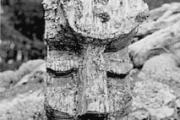Viewings: 5105

That in the Karelian taiga there are some strange wooden idols, experts heard. In memory of people still preserved fragments of ancient legends and traditions about the figures supplied by unknown in these remote places that the locals relied there with great difficulty. But the researchers did not doubt that the sculptures rotted away. Therefore, going into 2003, in an expedition to Belomorsk and Kem regions, members of the International megascience Academy (Petrozavodsk) and is not expected to find something special.
However, the findings exceeded all expectations. Wooden sculptures of pagan idols, located from each other about a half hour walk, all very different, was a unique Museum of wooden sculpture under the open sky. Lost in the depths of the Karelian taiga available its incomprehensibility, surrounded by a halo of them one guest Holiness, sternly and silently they looked at the strangers who had dared to violate their age-old peace. When and by whom they were built? Whose divine image of a bear? What magic power protects them from destruction?
- At first glance, the impression was that wooden sculptures are no visible system - said Vice-President of the International Academy of Maganak Alexei Popov. "We immediately started to doubt. After all the work on their manufacture was considerable, and hardly anyone had nothing to do moved a heavy logs in the Karelian wilderness just like that, the more that before to start to work, the log for a long time were soaked, so it has become a special strength and not subject to rapid destruction. Or for the apparent absence of pattern has a specific meaning in their arrangement, and the chosen venue for any reason not by chance? And if so, what determined the choice of the place? Questions arose enough.
Figures differ sharply from each other and size (from one up to 2,5 m height), and externally. Especially prominent was the one, his whole appearance resembling images of the famous and mysterious stone statues of Easter island. Whether it's an accident, whether echoes of some ancient knowledge that we will never hear. Images of other idols do not give any interpretation, because the information about wooden pagan gods of our ancestors even in the literature is very scarce, not to mention images.
Idol lake Karma
Judging by the structure of the tree, finds more than one hundred years (witnesses and legends), that is, the figures were erected in the end of XIX century At the time, despite entrenched already Christianity, elements of paganism (witchcraft) were still quite widespread in Karelia. But the most striking thing that near to found idols, they were still rotten "remains", which confirmed the reports of their periodic recoverability (according to some data, idols "restored" every 150 years).
The members of the expedition decided to first check the location of idols by the method of biolocation (the so-called ancient method of laskowska). Since ancient times, with vines were looking for underground water sources, deposits of metals. Methods of laskowska in the early days was widely used by inhabitants of Karelia. Not by chance that a branch of a vine is the symbol of prospectors - adorned the first coat of arms of Karelia. It is quite possible that the ancient builders idols could use the technique laskowska.
With the help of two l-shaped metal frameworks the specialists studied the location of sculptures by approaching them from different angles, and invariably framework reacted deviation in hand, not reaching idol 1-1,5 M. It was said that the idols installed in the centers of the so-called geoactive zone with a diameter of about three meters.
And here Alexey Popov has come to a surprising discovery. Making a mark on the map, he was surprised to find that the chain of idols is oriented strictly in the same direction, being located almost in a straight line in the direction of not less mysterious and fascinating one her name to the place - the lake Karma. (Karma is one of the basic concepts of the ancient Indian philosophy, associated with the law of spiritual and physical regeneration of mankind.) Surrounded by many kilometers of impassable swamps, lake practically not investigated and not described in the literature of regional studies, although some legends associated with him a "store of old information", revealing the veil of mystery over the "Hyperborean" last Karelia.
Lake Karma deals and the legend of the sacred "world tree", allegedly growing on the territory of the Republic, which was planted North Magi in the XIV century In the middle of the XVI century by the monk Kassian Muezersky, who arrived in this area with the Solovetsky monastery, a monastery was founded, and in 1602 built Church of St. Nicholas the Wonderworker. Still neighboring tree and the temple is a place of pilgrimage few keepers of ancient belief. By Sami and Karelian to the legends, the "tree" is a kind of the beginning of the "initiatory journey through the milestones are idols to the lake Karma.
- Itself seemed heretical thought: did in ancient times someone deliberately set a kind of milestone-idols to denote a certain way? By the way, even the name leaking a few kilometres of the river Okhta means drevnekamennogo as "guiding the river," says Alexei Popov. - It reminds ceremony, "initiatory journey". After all, still there are echoes of ancient Sami traditions and Karel, who saw this image made from wood or stone, a kind of "tool" direct instruction budding young men for introducing them to the state of shamans". Perhaps due to the fact that the magic structures were different depending on their location and other characteristics, complete dedication required "initiatory journey from one sacred place to another.
















